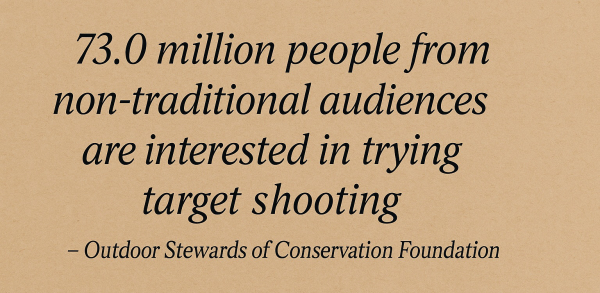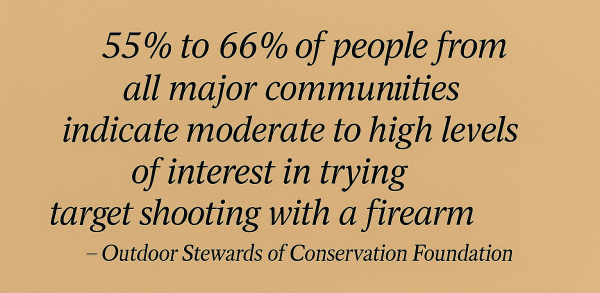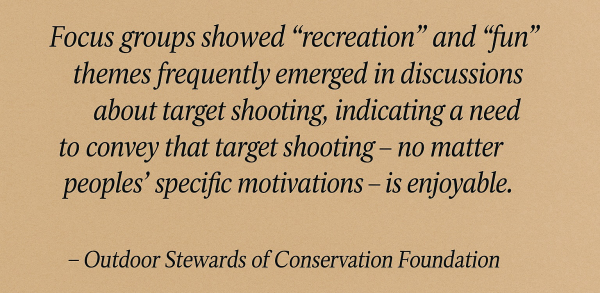With a poor economy, high interest rates, and brutal inflation over the last few years, is it any wonder that people are spending less of their disposable income on firearms and accessory-related purchases?
The same is true for recreational shooters—maybe not the high-level competitors showing up at major matches, but the entry-level gun owners (some 25 million-plus) who bought a new gun during the days of COVID, shot it once or twice, and then never returned to a shooting range.
Shooting participation has taken a dip. The good news is that it’s not because people suddenly don’t like guns, or shooting. It’s more a matter of limited financial resources and the myriad of marketing efforts, sales and promotions – across all industries – vying for those limited dollars.
In business terms, there are fewer ‘open to buy’ dollars available among consumers. So retailers and ranges have to up their game to entice reluctant consumers to relinquish some of those dollars.
Recent research from the Outdoor Stewards of Conservation Foundation (OSCF), along with Southwick Associates and DJ Case & Associates, offers excellent guidance on messaging to help convert new gun owners into active participants.

I highly recommend delving into that research—whether you’re a retail range business looking to expand your customer base or a sportsman’s club aiming to increase membership.
This report contains vital information to help you get new faces coming through the door. The key then is to make sure they leave with a desire to return. That’s where hospitality comes in.
Improving hospitality at a shooting range can significantly enhance the bottom line by improving repeat visitation, driving increased per-customer sales, and boosting customer lifetime value (CLV). While the core offering may be access to firearms, targets, and lanes, and/or competition, the range's success increasingly depends on how welcome, understood, and valued the customer feels.
Here are the down-stream results of focusing on hospitality at your range.
Hospitality Creates Repeat Customers
If you’ve ever eaten at a Chick-fil-A or an In-N-Out Burger, you know exactly how impactful their hospitality is—which is why nobody has ever been to one of these restaurants just once.
That’s because their culture of hospitality creates personal connections. At a range, a customer who is greeted by name, offered “the usual lane” or has a positive chat with staff is one who feels seen. That emotional connection fosters loyalty and turns a transactional visit into a habitual one.
Hospitality at a range also reduces intimidation, which is one of the key hurdles noted in the OSCF research. For many first-time shooters, walking into a gun range can be intimidating. A warm greeting, clear orientation, and a sense that questions are welcome without judgment can turn a nerve-wracking visit into an enjoyable, repeatable experience. Welcoming hospitality lowers barriers to entry.

New customers need to know they won’t make fools of themselves. Allowing a customer to embarrass themselves at your range is a sure way to turn them from eager patron to one-and-done.
And it’s hospitality that turns problems into opportunities. A hospitality-driven team resolves customer complaints or issues with empathy and efficiency. Instead of losing a customer due to a scheduling mix-up or equipment failure, you create a loyal advocate who remembers how well they were treated.
Hospitality Increases Per-Customer Sales
When staff are trained to engage customers with warmth and attentiveness, they’re more likely to notice opportunities to upsell—like suggesting premium ammunition, target upgrades, or eye and ear protection with better performance. A friendly employee offering a helpful, confident recommendation has a much higher success rate than one who simply rings up a lane rental.
Hospitality puts customers at ease. Instead of feeling like they’re being targeted by pushy sales tactics, they’re more likely to seek purchasing guidance.
If the range feels inviting and comfortable—clean bathrooms, good lighting, refreshments, and attentive service—customers are more likely to linger. That means higher ancillary spending at the café, pro shop, or on follow-up instruction or memberships.
The ability to keep customers on site through amenities is not to be underestimated. I’ve been one of those customers who stayed for lunch, hung out on a couch, and then jumped in with another group for a second round of sporting clays. The investment in comfort pays off.
When customers feel respected and welcomed, they’re more open to premium services like private lessons, tactical courses, gun cleaning, or VIP range experiences. These high-margin services often rely on strong rapport between the business and customer—something hospitality fosters directly.
There may be no better example of this than Gunsite Academy. I’ve watched as Gunsite’s CEO, Ken Campbell, visited with every student during lunch to ensure they are having a good time, getting what they need, and know where to find the pro shop. A former sheriff, Ken knows the value of ‘shaking hands and kissing babies.’
Hospitality Builds Customer Lifetime Value (CLV)
Customer Lifetime Value is the holy grail of sustainability. Good hospitality nudges the customer journey forward. A first-time visitor who feels welcome is more likely to sign up for a safety class. A class attendee who enjoys the experience may return for private training, then eventually purchase a membership. Each stage increases their lifetime value.
Customers who have a great experience don’t just come back—they bring others. Ranges with exceptional hospitality become destinations people talk about and recommend. Whether through word-of-mouth or social media, happy customers become free marketing.
Let me repeat the last part: free marketing.
Hospitality creates a sense of belonging. A range that treats customers like part of the family will see greater participation in special events, leagues, competitions, and exclusive sales—all opportunities to deepen engagement and grow spending over time.

In an activity-based business like a shooting range, the experience is the product. Guns and lanes might get them through the door once—but hospitality is what brings them back and gets them to spend more each time. By focusing on making every customer feel safe, respected, and valued, a shooting range can unlock higher per-visit revenues, build customer loyalty, and dramatically increase the long-term value of every relationship. The end result is a healthier, more profitable, and more sustainable business.
Lastly, hospitality—in a down economy filled with constant promotions and sales—is what separates you from all that competition. If a customer has limited dollars to spend, they are more likely to spend those dollars with the people they like, at the business that always treats them right.
– Paul Erhardt, Managing Editor, the Outdoor Wire Digital Network